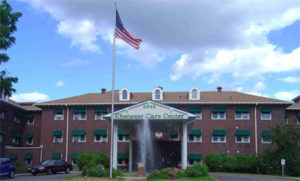BLOG
Call Us Today
(763) 746-7800
Get a Free Consultation
Contact Us Today
Ebenezer’s Neglect Causes Resident’s Death by Suicide
By Craig BaillieMarch 2, 2018
The Minnesota Department of Health (MDH) has completed its investigation of neglect concerns at the Ebenezer Care Center, a nursing home in Minneapolis, Minnesota. A complaint was filed with the MDH alleging that a resident was neglected when the nursing home did not adequately assess, monitor, or supervise him. The MDH investigated the matter and found that a resident who was at risk for suicide and elopement*, opened a second story window and fell out of the building. The MDH determined that the facility is responsible for neglect of the facility’s resident because it had not policies or systems to place window stoppers on resident windows.

The MDH concluded that Ebenezer Care Center violated federal law, namely, 42 CFR §483.25(d). This section states that “The facility must ensure that) (1) The resident environment remains as free of accident hazards as is possible; and (2)) Each resident receives adequate supervision and assistance devices to prevent accidents.” Federal guidance to this regulation states the following regarding the interpretation of this condition: “The intent of this requirement is to ensure the facility provides an environment that is free from accident hazards over which the facility has control and provides supervision and assistive devices to each resident to prevent avoidable accidents. This includes:
- Identifying hazard(s) and risk(s);
- Evaluating and analyzing hazard(s) and risk(s);
- Implementing interventions to reduce hazard(s) and risk(s); and • Monitoring for effectiveness and modifying interventions when necessary.”
In this case, MDH concluded that the “accident” was avoidable, which means that: “an accident occurred because the facility failed to:
- Identify environmental hazards and/or assess individual resident risk of an accident, including the need for supervision and/or assistive devices; and/or
- Evaluate/analyze the hazards and risks and eliminate them, if possible, or, if not possible, identify and implement measures to reduce the hazards/risks as much as possible; and/or
- Implement interventions, including adequate supervision and assistive devices, consistent with a resident’s needs, goals, care plan and current professional standards of practice in order to eliminate the risk, if possible, and, if not, reduce the risk of an accident; and/or
- Monitor the effectiveness of the interventions and modify the care plan as necessary, in accordance with current professional standards of practice.”
Medicare rates nursing homes, including this 127-bed nursing home facility. Medicare has assigned an overall rating to Ebenezer Care Center as a “below average” facility with a two-star rating. In addition, Medicare has assigned an overall rating to Ebenezer Care Center as a “much below average” facility based on the government’s health inspections of the facility. Deficiencies cited by Medicare from a February 17, 2017, survey include Ebenezer Care Center’s failure to:
- Hire only people with no legal history of abusing, neglecting or mistreating residents; or 2) report and investigate any acts or reports of abuse, neglect or
mistreatment of resident; - Make sure each resident has the right to have a choice over activities, their schedules and health care according to his or her interests, assessment, and plan of care;
- Provide doctors orders for the resident’s immediate care, at the time the resident was
admitted; - Make sure services provided by the nursing facility meet professional standards of
quality; and - Provide care by qualified persons according to each resident’s written plan of care.
This is not the first time that an Ebenezer facility has failed to protect individuals from falling out of a window with a history of suicidal ideation. On October 4, 2017, a resident of Ebenezer’s assisted-living facility in Minneapolis died after falling out of a window. The Hennepin County Medical Examiners concluded that the decedent had a history of bipolar disorder and depression that resulted in death by suicide. The MDH is currently review this incident to determine whether it was caused by the neglect of Ebenezer.
The Kosieradzki • Smith Law Firm represents clients in cases involving catastrophic injury caused by nursing homes and other care facilities that fail to provide proper care. If you believe your loved one has been harmed due neglect or abuse in a nursing home or other care facility, take action and contact the Kosieradzki • Smith Law Firm online or call us toll-free at (877) 552-2873 to set up a no-cost, no-obligation consultation.
NURSING HOME COMPARE:
http://www.medicare.gov/NursingHomeCompare/search.aspx
*The definition of elopement provided by CMS is as follows: “elopement occurs when a resident leaves the premises or a safe area without authorization (i.e., an order for discharge or leave of absence) and/or any necessary supervision to do so. A resident who leaves a safe area may be at risk of (or has the potential to experience) heat or cold exposure, dehydration and/or other medical complications, drowning, or being struck by a motor vehicle. Facility policies that clearly define the mechanisms and procedures for assessing or identifying, monitoring and managing residents at risk for elopement can help to minimize the risk of a resident leaving a safe area without authorization and/or appropriate supervision. In addition, the resident at risk should have interventions in their comprehensive plan of care to address the potential for elopement. Furthermore, a facility’s disaster and emergency preparedness plan should include a plan to locate a missing resident.”












